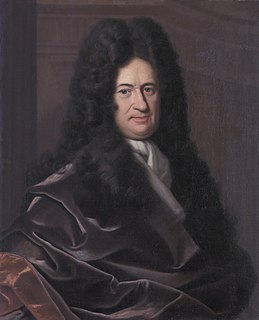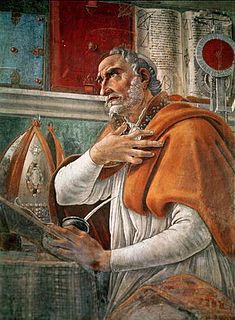| Look up privation in Wiktionary, the free dictionary. |
Privation is the absence or lack of basic necessities. [1]
| Look up privation in Wiktionary, the free dictionary. |
Privation is the absence or lack of basic necessities. [1]
In child psychology, privation occurs when a child has no opportunity to form a relationship with a parent figure, or when such relationship is distorted, due to their treatment. [2] It is different to deprivation, which occurs when an established relationship is severed. [3] It is understood that privation can produce social, emotional and intellectual problems for children; however, how inevitable such problems become as a result of privation, and the extent to which they can be reversed, remains an issue of debate among psychologists. [4]
In philosophy, privation may refer to the absence of a necessary quality in the universe.[ citation needed ] [5]
For example, as part of his theodicy, Augustine denied the existence of evil as its own entity; rather, he described evil as a privation, or going wrong, of good, privatio boni . [6]
Jewish philosopher Maimonides argued that privation is not necessarily a bad thing: it would be trivial to regard the privation of hair – baldness – as an evil.

Augustine of Hippo, also known as Saint Augustine, was a theologian and philosopher of Berber origin and the bishop of Hippo Regius in Numidia, Roman North Africa. His writings influenced the development of Western philosophy and Western Christianity, and he is viewed as one of the most important Church Fathers of the Latin Church in the Patristic Period. His many important works include The City of God, On Christian Doctrine, and Confessions.

Evil, in a general sense, is defined by what it is not—the opposite or absence of good. It can be an extremely broad concept, although in everyday usage it is often more narrowly used to talk about profound wickedness. It is generally seen as taking multiple possible forms, such as the form of personal moral evil commonly associated with the word, or impersonal natural evil, and in religious thought, the form of the demonic or supernatural/eternal. While some religions, world views, and philosophies focus on "good versus evil", others deny evil's existence and usefulness in describing people.

Karma means action, work, or deed. The term also refers to the spiritual principle of cause and effect, often descriptively called the principle of karma, wherein intent and actions of an individual (cause) influence the future of that individual (effect): Good intent and good deeds contribute to good karma and happier rebirths, while bad intent and bad deeds contribute to bad karma and bad rebirths.
Pelagianism is a heterodox Christian theological position that holds that the original sin did not taint human nature and that humans have the free will to achieve human perfection without divine grace. Pelagius, a British ascetic and philosopher, taught that God could not command believers to do the impossible, and therefore it must be possible to satisfy all divine commandments. He also taught that it was unjust to punish one person for the sins of another; therefore, infants are born blameless. Pelagius accepted no excuse for sinful behavior and taught that all Christians, regardless of their station in life, should live unimpeachable, sinless lives.
The problem of evil is the question of how to reconcile the existence of evil and suffering with an omnipotent, omnibenevolent, and omniscient God. There are currently differing definitions of these concepts. The best known presentation of the problem is attributed to the Greek philosopher Epicurus. It was popularized by David Hume.

Theodicy means vindication of God. It is to answer the question of why a good God permits the manifestation of evil, thus resolving the issue of the problem of evil. Some theodicies also address the evidential problem of evil by attempting "to make the existence of an all-knowing, all-powerful and all-good or omnibenevolent God consistent with the existence of evil or suffering in the world". Unlike a defense, which tries to demonstrate that God's existence is logically possible in the light of evil, a theodicy attempts to provide a framework wherein God's existence is also plausible. The German philosopher and mathematician Gottfried Leibniz coined the term "theodicy" in 1710 in his work Théodicée, though various responses to the problem of evil had been previously proposed. The British philosopher John Hick traced the history of moral theodicy in his 1966 work, Evil and the God of Love, identifying three major traditions:

Mary Beatrice Midgley was a British philosopher. A senior lecturer in philosophy at Newcastle University, she was known for her work on science, ethics and animal rights. She wrote her first book, Beast And Man (1978), when she was in her fifties, and went on to write over 15 more, including Animals and Why They Matter (1983), Wickedness (1984), The Ethical Primate (1994), Evolution as a Religion (1985), and Science as Salvation (1992). She was awarded honorary doctorates by Durham and Newcastle universities. Her autobiography, The Owl of Minerva, was published in 2005.
The absence of good, also known as the privation theory of evil, is a theological and philosophical doctrine that evil, unlike good, is insubstantial, so that thinking of it as an entity is misleading. Instead, evil is rather the absence, or lack (“privation”), of good. This also means that everything that exists is good, insofar as it exists; and is also sometimes stated as that evil ought to be regarded as nothing, or as something non-existent.
Child psychopathology refers to the scientific study of mental disorders in children and adolescents. Oppositional defiant disorder, attention-deficit hyperactivity disorder, and autism spectrum disorder are examples of psychopathology that are typically first diagnosed during childhood. Mental health providers who work with children and adolescents are informed by research in developmental psychology, clinical child psychology, and family systems. Lists of child and adult mental disorders can be found in the International Statistical Classification of Diseases and Related Health Problems, 10th Edition (ICD-10), published by the World Health Organization (WHO) and in the Diagnostic and Statistical Manual of Mental Disorders, Fifth Edition (DSM-5), published by the American Psychiatric Association (APA). In addition, the Diagnostic Classification of Mental Health and Developmental Disorders of Infancy and Early Childhood is used in assessing mental health and developmental disorders in children up to age five.
Theological determinism is a form of predeterminism which states that all events that happen are pre-ordained, and/or predestined to happen, by one or more divine beings, or that they are destined to occur given the divine beings' omniscience. Theological determinism exists in a number of religions, including Judaism, Christianity, and Islam. It is also supported by proponents of Classical pantheism such as the Stoics and Baruch Spinoza.

In biology, a lumen is the inside space of a tubular structure, such as an artery or intestine. It comes from Latin lumen 'an opening'.

The Irenaean theodicy is a Christian theodicy. It defends the probability of an omnipotent and omnibenevolent God in the face of evidence of evil in the world. Numerous variations of theodicy have been proposed which all maintain that, while evil exists, God is either not responsible for creating evil, or he is not guilty for creating evil. Typically, the Irenaean theodicy asserts that the world is the best of all possible worlds because it allows humans to fully develop. Most versions of the Irenaean theodicy propose that creation is incomplete, as humans are not yet fully developed, and experiencing evil and suffering is necessary for such development.

The mind–body problem is a debate concerning the relationship between thought and consciousness in the human mind, and the brain as part of the physical body. It is distinct from the question of how mind and body function chemically and physiologically, as that question presupposes an interactionist account of mind–body relations. This question arises when mind and body are considered as distinct, based on the premise that the mind and the body are fundamentally different in nature.
Victor Francis White (1902–1960) was an English Dominican priest who corresponded and collaborated with Carl Gustav Jung. He was initially deeply attracted to Jung's psychology, but when Jung's Answer to Job was published in English, he gave it a very critical review. White's works include Soul and Psyche and God and the Unconscious. Jung and White enjoyed a series of correspondence, and Jung was so impressed with some of White's ideas that he invited White to his retreat house at Bollingen, where only Jung's very close friends were allowed. The correspondence between Jung and White has been published by Lammers and Cunningham (2007). While White was a great admirer of Jung, he was at times very critical of Jung. For example, he criticised Jung's essay "On the Self", and accused Jung of being too bound to a Manichaean dualism. He was also somewhat critical of Jung's Kantianism. At the same time, Jung was quite critical of White, for example, over his commitment to the doctrine of privatio boni as means of understanding the problem of evil.
Matt Jarvis is a Chartered Psychologist and Chartered Scientist. He currently teaches psychology education at Totton College and freelances as an author and trainer, including for the Science Learning Centres. Jarvis is best known as a British author of psychology textbooks, including both introductory student texts and professional-level texts for teachers.

The Augustinian theodicy, named for the 4th- and 5th-century theologian and philosopher Augustine of Hippo, is a type of Christian theodicy that developed in response to the evidential problem of evil. As such, it attempts to explain the probability of an omnipotent (all-powerful) and omnibenevolent (all-good) God amid evidence of evil in the world. A number of variations of this kind of theodicy have been proposed throughout history; their similarities were first described by the 20th-century philosopher John Hick, who classified them as "Augustinian". They typically assert that God is perfectly (ideally) good, that he created the world out of nothing, and that evil is the result of humanity's original sin. The entry of evil into the world is generally explained as consequence of original sin and its continued presence due to humans' misuse of free will and concupiscence. God's goodness and benevolence, according to the Augustinian theodicy, remain perfect and without responsibility for evil or suffering.

Cosmetic electrotherapy is a range of beauty treatments that uses low electric currents passed through the skin to produce several therapeutic effects such as muscle toning in the body and micro-lifting of the face. It is based on electrotherapy, which has been researched and accepted in the field of rehabilitation, though the "scientific and medical communities have tended to sideline or dismiss the use of electrotherapy for healthy muscles".

Augustinianism is the philosophical and theological system of Augustine of Hippo and its subsequent development by other thinkers, notably Boethius, Anselm of Canterbury and Bonaventure. Among Augustine's most important works are The City of God, De doctrina Christiana, and Confessions.
Theistic finitism, also known as finitistic theism or finite godism, is the belief in a deity that is limited. It has been proposed by some philosophers and theologians to solve the problem of evil. Most finitists accept the absolute goodness of God but reject omnipotence.
Religious responses to the problem of evil are concerned with reconciling the existence of evil and suffering with an omnipotent, omnibenevolent, and omniscient God. The problem of evil is acute for monotheistic religions such as Christianity, Islam, and Judaism whose religion is based on such a God. But the question of "why does evil exist?" has also been studied in religions that are non-theistic or polytheistic, such as Buddhism, Hinduism, and Jainism.